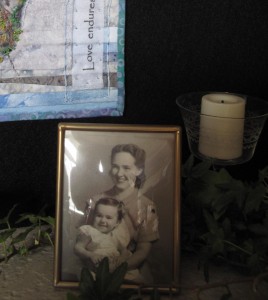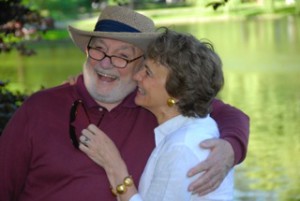 My mother was a people person who was endlessly fascinated by the human eccentricities and idiosyncracies she observed around her. She was a delighted visual and, when possible, audio eavesdropper on everyone, everywhere. As a result, she had a well-developed sense of the ridiculous. She loved slapstick. She adored droll and self-deprecating British humor. When I was a child, she was the only adult I knew who laughed out loud at books so hard she wept. She poked fun at herself easily, and to the extent that any of her children are able to regard ourselves with wry humility, it is her example that taught us that skill.
My mother was a people person who was endlessly fascinated by the human eccentricities and idiosyncracies she observed around her. She was a delighted visual and, when possible, audio eavesdropper on everyone, everywhere. As a result, she had a well-developed sense of the ridiculous. She loved slapstick. She adored droll and self-deprecating British humor. When I was a child, she was the only adult I knew who laughed out loud at books so hard she wept. She poked fun at herself easily, and to the extent that any of her children are able to regard ourselves with wry humility, it is her example that taught us that skill.
Indeed, I believe that it was her sense of humor – far more than her courage or wisdom or faith in either G-d or science – which gave her the ability to sit lightly to her “self,” and carried her with confidence and grace through the cancer that ended her life at 58.
As her eldest, I must have been a trial to her in my early years because I was a very serious child. And, as an only child surrounded by adults, I was always on guard lest I do something that would cast me into the outer darkness of silent disapproval. But Mom was irrepressible and by my early teens I had discovered both G. K. Chesterton and Mad Magazine (not to mention the Pink Panther movies, Beyond the Fringe, and Noel Coward.) Satire, irony, deadpan, slapstick, pratfalls; it was all good. As an actress and then as a preacher, the moments I remember most vividly are those when I opened space for people to laugh, loud and long.
But I had never heard of Charlie Hebdo until last Wednesday (7 January 2015). It had passed totally below my radar screen – and, apparently, the radar screens of about 99.999% of the world – until terrorists killed the editor, nine other journalists, and two police officers to avenge what they believed was an insult to the prophet Mohammad. Insuring wide-spread interest among a formerly oblivious population and insuring that the name of the magazine would be on everyone’s lips is probably not the consequence devoutly wished by those who mounted the attack.
Others, far more politically savvy and diplomatically astute than I will write important editorials about the implications and potential outcomes of this attack. Many people will take this violent act (and continued threats to the freedom of speech, freedom of the press, freedom of worship, freedom from fear) very seriously. And I don’t want to suggest that we make light of the escalating stream of deaths that mark the upsurge in terrorism as an overly aggressive way of expressing an opinion. But I would like to suggest that taking ourselves (and our Divine One, however we name her or him) too seriously may be the root of the problem.
As someone who has said, “It’s the principle of the thing…” more times than I can count, I would observe from the ripe age of 60+ that principles are very slippery slopes on which to take a stand. Because much as we serious people would like to believe that principles are absolutes, they aren’t. They are human constructs (like religions, and political systems, and economies, and etiquette, and social mores). My daughter has taught me to follow up the phrase, “It’s the principle of the thing…” with the question, “Is this the hill you are prepared to die on?” Very occasionally the answer to the latter question is, “Yes.” But when it isn’t, I find that I can often discover a way to model my principle in a non-oppressive, respectful manner.
So, as frightening as this violence was, we do not need to either barricade ourselves in our homes in fear that we will be next, nor do we need to go on the offensive and apply for concealed carry licenses on the  principle of the thing. What we all need to do is laugh a lot more – at ourselves, at our pretensions, at our (very) limited perspective, at our self-righteousness. We need to take a moment to dial it back and realize that our identity will not be destroyed by a little fun. (Our pride may take a pratfall, but we will survive the experience.) G-d’s being will not be destroyed if someone tells a joke, or draws a cartoon, or writes a satirical play, or carves a crucifix with a woman on it. Do we really think that God is so insecure that s/he cannot laugh at her/himself? The teachings of Jesus are not made less profound by the manufacture of a bobble-headed figurine of Himself to stick on a dashboard. The teachings of Mohammad are not made less meaningful by a French (or Danish or American) cartoon. The teachings of Buddha are not made less by all the Baby-boomers thinking that chanting Om will lead to full enlightenment sometime this weekend…and could we hurry up, I have a train to catch?
principle of the thing. What we all need to do is laugh a lot more – at ourselves, at our pretensions, at our (very) limited perspective, at our self-righteousness. We need to take a moment to dial it back and realize that our identity will not be destroyed by a little fun. (Our pride may take a pratfall, but we will survive the experience.) G-d’s being will not be destroyed if someone tells a joke, or draws a cartoon, or writes a satirical play, or carves a crucifix with a woman on it. Do we really think that God is so insecure that s/he cannot laugh at her/himself? The teachings of Jesus are not made less profound by the manufacture of a bobble-headed figurine of Himself to stick on a dashboard. The teachings of Mohammad are not made less meaningful by a French (or Danish or American) cartoon. The teachings of Buddha are not made less by all the Baby-boomers thinking that chanting Om will lead to full enlightenment sometime this weekend…and could we hurry up, I have a train to catch?
No, it is not desirable (or loving or kind) to laugh in the face of someone else’s misfortune or pain or humiliation or suffering, but it is life-giving to be able to laugh in the face of our own. As Norman Cousins discovered almost two decades ago, laughter is literally life-giving. Laughter literally heals hearts, minds, spirits, and bodies. In fact, it is quite likely that laughter can heal the world.
Yes, 2014 was a year of deep and widespread hardship, and 2015 has not started particularly auspiciously. We can grit our teeth and prepare to ride it out. Or we can decide to make the risky choice to laugh. If we pay attention to our own personal behaviors (trust me on this one), we will have plenty to get us started. Maybe there will be trials and tribulations in plenty this year, too, but in honor of those who died in the offices of Charlie Hebdo, we can choose to let laughter rather than gunfire be the last word.
–Andrea
Text © 2015, Andrea La Sonde Anastos
Photos © 1951, 2008, both reprinted by permission